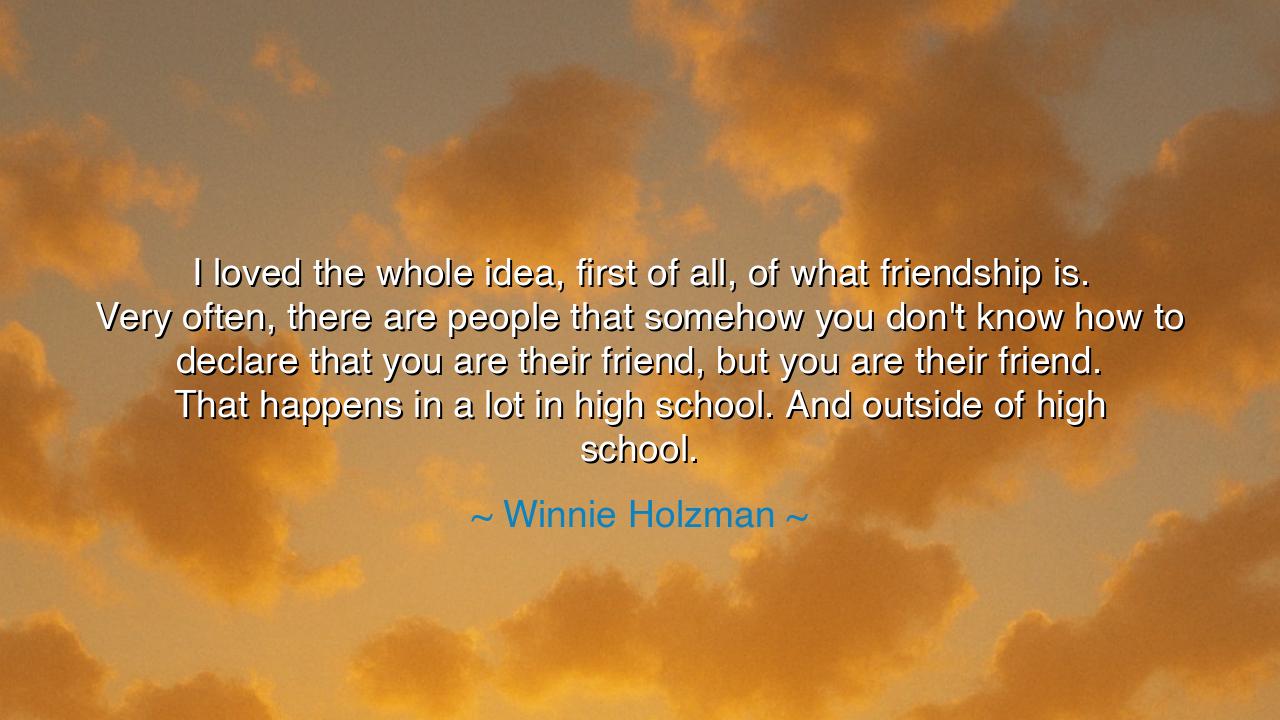
I loved the whole idea, first of all, of what friendship is. Very
I loved the whole idea, first of all, of what friendship is. Very often, there are people that somehow you don't know how to declare that you are their friend, but you are their friend. That happens in a lot in high school. And outside of high school.






In the vast and intricate tapestry of human connection, there exists a bond so sacred and profound that it often transcends the limitations of words. Winnie Holzman reflects on this truth when she says: "I loved the whole idea, first of all, of what friendship is. Very often, there are people that somehow you don't know how to declare that you are their friend, but you are their friend. That happens in a lot in high school. And outside of high school." These words capture the mysterious nature of friendship—a connection so deep that it does not always need declaration or even formal acknowledgment. It simply exists, quietly binding two souls together, sometimes without explicit recognition, but always present in the shared moments, experiences, and unspoken understandings between them.
The ancients too spoke of a friendship that was born not of outward titles, but of a mutual bond that existed beyond the need for verbal confirmation. Aristotle, in his musings on friendship, described it as a relationship based on shared virtue, where both individuals recognize in one another a kindred spirit, even if they do not declare it openly. He acknowledged that true friendship is a bond so deep that it transcends the need for external validation—it exists because it naturally does, grounded in the shared respect, trust, and empathy between two people. This type of friendship is not defined by labels, but by the authentic connection that forms over time.
Similarly, in the ancient world, the concept of philia—the Greek term for friendship—spoke of the kind of bond that grows out of shared experiences and emotional connection, not out of formal recognition. Consider the relationship between David and Jonathan in the Bible, whose friendship was so profound that it was often described as being closer than that of brothers. Their connection was not based on the need to declare it, nor on external formalities; it was simply a shared understanding and a deep, unspoken loyalty. Despite the challenges they faced, their bond was built on something greater than public acknowledgment—it was built on a recognition of each other's strengths, vulnerabilities, and shared mission. Their friendship, like the one Holzman describes, was not defined by societal labels, but by the authenticity of their relationship.
The beauty of Holzman’s reflection is the understanding that friendship is not always something that needs to be put into words. It exists in the quiet moments, in the shared experiences, in the unspoken understanding that one is there for the other, even if the formal declaration of “friend” has not been made. In high school, as Holzman mentions, many friendships are born in fleeting, unacknowledged ways—perhaps between two people who sit together in class, or those who share a simple walk home. Their connection is evident in the comfort they find in each other, in the silent trust that builds between them over time. The friendship is there, even without a name, much like the relationships that can blossom in life when we least expect them.
This idea of friendship existing without a formal declaration can also be found in the Roman tradition of amicitia, where bonds were formed through shared responsibilities and mutual obligations, but not always declared outright. The Roman Republic was built upon networks of friendship between leaders, soldiers, and citizens, many of which were unspoken yet critical to the success of the state. These friendships were cemented through actions, through loyalty and support, not through words. A soldier might fight for his general not because the general declared them friends, but because their shared goals and mutual respect bound them together in a way that words could never truly capture.
In our own lives, we often feel the same way—friendships formed through shared experiences at work, in communities, or with family, are sometimes not explicitly declared but are understood. Holzman’s reflection reminds us that friendship does not require formal recognition or public proclamation to be real. It is in the way we stand by others, the way we offer support, or the way we simply understand one another without words. It is the quiet moments of connection that define the strength of a relationship, not the labels we put on it.
The lesson for us all is this: friendship is a gift that transcends boundaries and does not require formal acknowledgment to be meaningful. We must recognize that the bonds we share with others are often more profound than we give them credit for, and that sometimes the most important connections are those that are not immediately apparent or acknowledged. In our own lives, we should seek to value and nurture these unspoken friendships, understanding that true connections often grow in the spaces between words and formal declarations. Just as Socrates and Plato shared a bond based on mutual respect and intellectual engagement, we too must recognize the quiet friendships that sustain us, even when the world does not always acknowledge them. In this, we find that true friendship is not defined by labels or titles, but by the deep connection that transcends the need for words.






AAdministratorAdministrator
Welcome, honored guests. Please leave a comment, we will respond soon